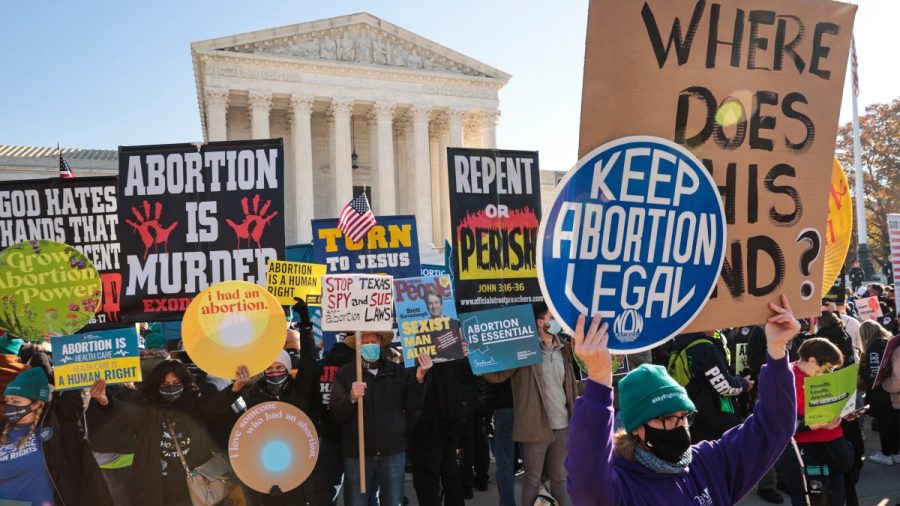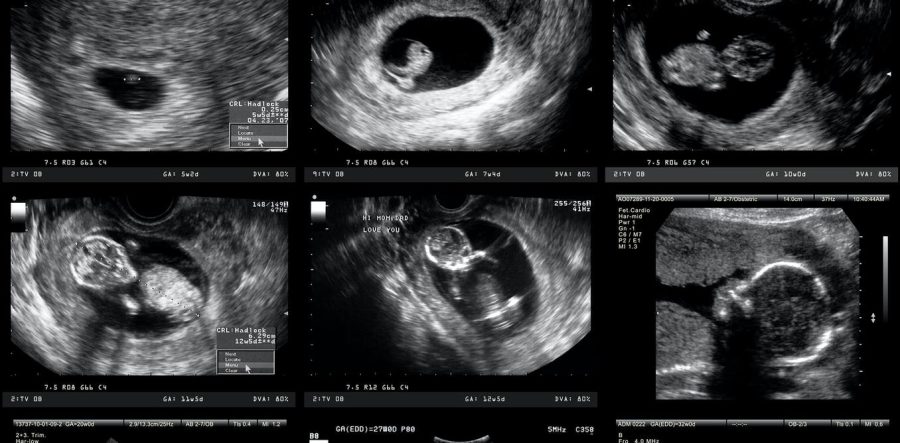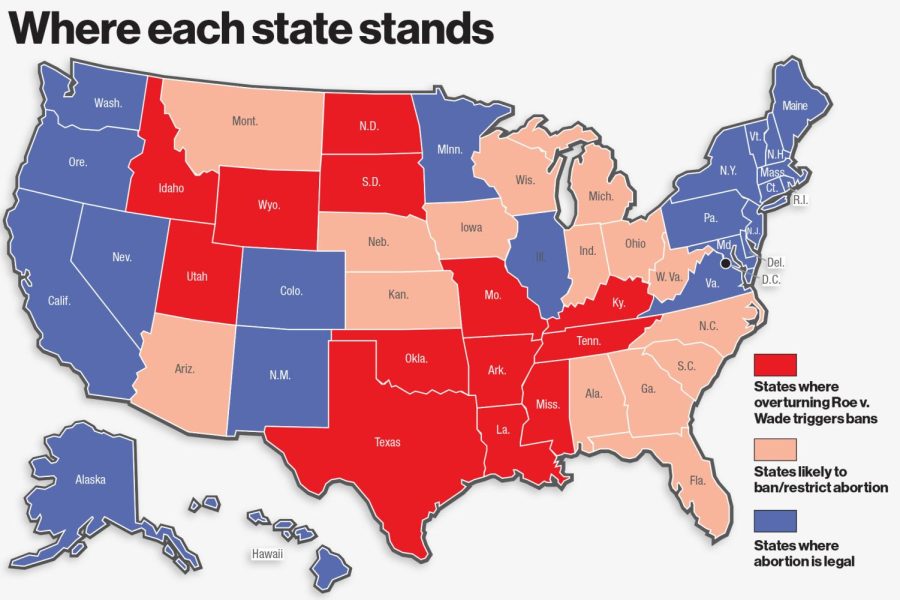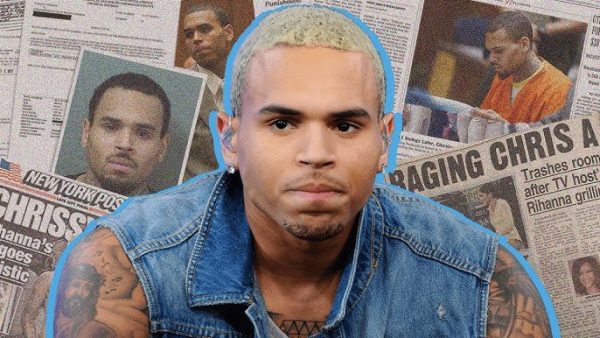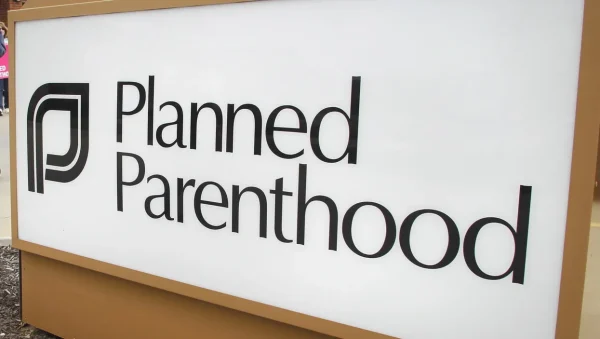OP/ED: Even Before The Supreme Court Leak, Access To Abortion Has Been Dying For Decades
When she rested her head on her pillow every night, she prayed that her son would die inside of her so that she wouldn’t have to make the decision.
When she was finally able to close her eyes and drift off to sleep, she imagined her son, who would have been her first walking hand in hand with her and her husband down the street and taking him to school everyday and telling him she loved him so much in front of his classmates that he cheeks would flush red like a bouquet of roses from the flower shop on Valentines Day and beg for her to leave. She loved her son even before he was born. Long before he was the size of a poppy seed inside her uterus.
His name was Darby- Joss and he died at 20 weeks gestation through an abortion.
When Darby’s mother, Dr. Erica Goldblatt Hyatt and her husband found out they were having a baby, to say they were happy was an understatement. They were doing well in their lives, happily married and ready to start a family. But, when they found out that Darby had never developed an airway, their cheers turned to tears.
Darby had Trisomy 16. A rare chromosomal abnormality where there are 3 copies of chromosome 16 rather than two. About 6 percent of miscarriages have trisomy 16 and if he didn’t die in her womb, he would have been born brain dead. The couple tried every option to help save Darby including fetal surgery, but quickly learned that he was not a candidate for the procedure. Since he was diagnosed later in her pregnancy, they didn’t have much of a choice but she knew she couldn’t give birth to a baby who would never leave an ICU or breathe or think on his own.
There would be no life for him.
They thought about how they would have to leave their jobs to provide full-time care for a brain-dead baby (if he lived), and how any future children they had would play a role and would probably have to take care of him as well.
“I desperately wanted to have my baby, but the decision was for him, not for me, so that he could find peace. I was heartbroken and still am, but it was the right choice.” says Dr. Hyatt.
Darby is one of the 40 to 50 million children who are aborted every year according to WHO. To put that in perspective, that is nearly 125,000 abortions per day.
But Darby’s story is not like most of the stories of abortions you hear on the news every day. You probably are used to hearing of women choosing to end their pregnancy due to not being ready for a child than hearing a mix of emotions from the story.
But what do you do when the decision to have an abortion is not up to you?
On May 3, Politico published a leaked draft detailing that the majority opinion of the Supreme Court would overturn the landmark Roe v. Wade decision, which grants abortion protection under a federal constitutional right. If overturned, it would overturn return the decision of the legality of abortion to each state and with many already passing stricter laws on abortion, it could lead to many more states outlawing it then protecting it.
“Roe was long expected to fall as it was based on poor constitutional law and had been chipped away for so long that states were able to enact many abortion bans before it came to SCOTUS,” said Hyatt.
In fact, the end of legal abortion has been brewing long before the draft was released. According to the National Partnership of Women and Families, minority women and those of low income have a nearly impossible time obtaining an abortion due to a lack of access to quality healthcare or funds to pay out of pocket for abortion.
Despite this, black women are five times more likely to have an abortion than white women according to Guttmacher Institute. Even before having one, Blacks and Hispanics have a greater burden of obtaining access to adequate health care and contraception and are more prone to health diseases such as diabetes and cancer which they are twice as likely to have than white people.
The debate about abortion begins with better access to contraception, according to Jess Meeth from Democrats For Life.
“About 73 percent of women feel like they can’t keep their baby because of economic hardship,” says Meeth. “We need legislation that is going to support these women, especially if Roe is overturned”
Meeth and her organization Democrats For Life break the stereotype of the common pro-life supporters. Conservatives. According to The Athletic , most of the anti-abortion politicians fighting against Roe are conservative Republicans. Democrats For Life make up some of the 21 pro-life Democrats in the United States according to Meeth and the answer for why is simple.
“Science is pro life,” says Meeth. “Science tells us that life begins at fertilization… these children in the womb have life they’re growing and there is no other human right than the right to life”
According to Princeton, Human development at fertilization begins with the contact of a sperm with a secondary oocyte and ends with the fusion of their pronuclei. and the mingling of their chromosomes to form a new cell. This fertilized ovum, known as a zygote, is a large diploid cell that is the beginning, or primordium, of a human being.
The creation of life and the right to respect are two of the driving factors of the right-to-life movement. According to The Organization of American Historians, many of the arguments for life include autonomy, and the extension of rights and to letting bodily processes speak for themselves and to not let doctors decide a fetus’ future.
“There are not any other human rights other than the right to life,” says Meeth.
In addition to the rhetoric used since the beginning, newer discussions about the pro-life movement include that the right to life is really an individual rights movement, a civil rights movement, a family values movement, and a women’s movement.
However, to Joerg Dreweke, the Associate Director of US Communications at Guttmacher Institute, that is simply not the case.
“The language around fetal personhood has been part of a deliberate, long-term strategy to ban abortion and many methods of birth control—with the ultimate goal of rolling back people’s basic human right to self-determination and bodily autonomy.”
Even prior to the Supreme Court draft leak, we have seen a number of states rolling back laws that assured a woman’s access to an abortion. In Texas, it is illegal to have an abortion once a fetal heartbeat can be detected, which could be as early as 6 weeks which is known as the Texas Heartbeat Act. Prior to this law, the state allowed abortions up to 20 weeks of pregnancy. In Kentucky, abortions after 20 weeks can be considered a felony, unless it’s performed to save a woman’s life or if there is a serious risk of substantial and irreversible health conditions.
“Should my kidney or my appendix, or any other part of my body, have the same autonomy as me? A growing fetus deserves care as a patient if a parent decides to keep a pregnancy, but patient-hood is not person-hood. The fetus is a blueprint for a person, but not quite yet. It is growing inside a living person. Therefore, its needs supersede those of its parent,” says Dr. Goldblatt Hyatt.
When Wayne A. Gnatuk, reverend Clergy and Board Chair member of Kentucky Religious Coalition for Reproductive Choice, was a senior in college. He was working as a volunteer at a college radio station when he got to receive the news release of the Roe vs. wade decision. Ever since he’s been a supporter of the pro-choice movement.
“As a pastor, it’s not my call to tell the women what they should do, that’s the woman’s job to decide what she wants to do. I understood that it was hands off her body” says Gnatuk.
While he was in ministry in Kentucky, he he recalls up to 20 times when he would help advise women on where to get abortions in the area. While some of those women ended up going through with the procedure, some ended up keeping their babies.
“While I wasn’t an activist, I was pro-choice and pro-choice includes the right for the woman to have the baby,” says Gnatuk.
While working as a pastor in West Virginia, he worked closely with many low-income residents; a pastor in West Virginia then became part of the National Staff of Poverty. There, his work dealing with poverty brought him more in touch with issues involving poverty including racism, and economic injustice.
When he retired, he felt like he was at a crossroads regarding how he was going to spend the later years of his life. When the decision finally came, he credits God for calling him to become an advocate for reproductive justice.
The debate of morality and abortion has been a hot topic among believers in faith since the very beginning .According to Pew Research, 79 percent of people who absolutely believe in God, believe that abortion should be illegal in all or most cases. It also finds that different religions believe different things when it comes to what they believe the legality of abortion should be, with 82 percent of Buddhists saying it should be illegal in all or most cases along with 48 percent of Catholics.
Typically, where you stand depends on when you believe life begins and who you think has the right to make the decisions. For Gnatuk, his belief is that human life begins at the moment the prenatal has spiritual liability or when ensoulment takes place, which is typically in the pre birth days and weeks.
“No one should have the right to make the decision on what to believe for someone else,” says Gnatuk. “Every woman, every man should have the right to choose which opinion to have and you don’t have the right to tell what is the religious right to have or not to have.”
Gnatuk’s home state of Kentucky is one of the harshest states when it comes to abortion with a plethora of abortion restriction laws being put in place in the past couple of decades, one of which was a law that was signed that would ban abortions after 15 weeks of pregnancy which was recently blocked off by a federal judge back in April. A federal judge on Thursday temporarily blocked a state law that effectively eliminated abortions in Kentucky after the state’s two remaining clinics said they couldn’t meet its requirements.
Being a pro-abortion activist in one of the most conservative states in the country is a difficult task for anyone, let alone a former reverend.
“In Kentucky, two-thirds are supportive of abortion in some circumstances but what we have is the same thing we have at the national level, which is that a minority who are mostly men, are speaking for a majority,” says Gnatuk.
Raised as a Republican but switched to a Democrat when he moved to West Virginia, one of the driving factors for his switch was that he didn’t want to be associated with former president Ronald Reagan. Ghatuk believed that Reegan, along with many other conservatives, enforced the belief that has been frequently associated with many other conservatives that your stance on abortion is based on whether you are a decent human.
“It’s challenging but it’s also rewarding,” says Ghatuk. “I’ve always been one to not stop pushing for what I feel is right and when you find a pastor that is pushing for what is right, then you have found a real pastor.”
The struggle of obtaining an abortion is difficult but the treatment women receive afterward can be harder to bear. Even though she has 15 years of experience as a clinician, Dr. Goldblatt Hyatt still has a difficult time dealing with the backlash she receives from her abortion in her community. Growing up in a very religious community, she found that even though people were being kind to her in person, the same people would go on social media and discuss how she murdered her child.
While her family and close friends were always supportive of her decision and even encouraged her and her husband to consider abortion even when she was on the fence, the chatter from others was always on the back of her mind.
“At the time I lived in a very religious community and people were kind to me about it to my face only for me to find out on social media that they were talking about how I had murdered my child. It was one of the reasons why I left that community and the job where I worked that was associated with that community,” says Hyatt
As I speak to you now, we are on the precipice of the future of reproductive rights in the United States. Democrat, Republican, Liberalist or Socialist, one thing we can all agree on is that the future of “right” is hanging on by an invisible string that could break at any moment. Even though we have been divided long before Roe vs. Wade, we must educate ourselves on the truth of abortion rather than living off of what we’ve heard through skewed narratives. This debate is too important to sit on the sidelines and watch because everyone believes that they know what is right or wrong when it comes to abortion.
Until it happens to you.
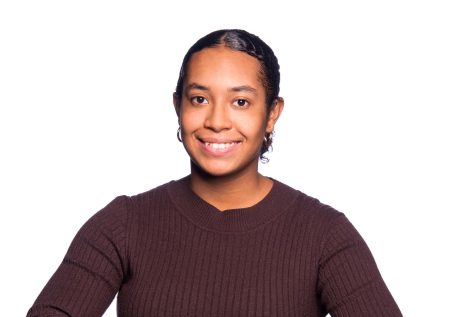
Britney Guzman is a Senior at Mercy College. She writes a column called Quali-Tea News where she discusses her love for cats, Taylor Swift and mental...



